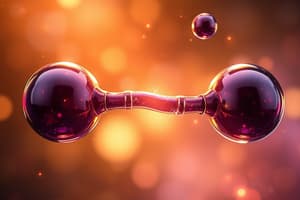Podcast
Questions and Answers
What type of ionic compound is formed between a metal and a polyatomic ion?
What type of ionic compound is formed between a metal and a polyatomic ion?
Polyatomic ionic compound
What is the term for ionic compounds that contain water molecules?
What is the term for ionic compounds that contain water molecules?
Hydrates
What is the process by which a metal loses one or more electrons to become a cation?
What is the process by which a metal loses one or more electrons to become a cation?
Ionization
What is the primary force that holds ions together in an ionic compound?
What is the primary force that holds ions together in an ionic compound?
What is a characteristic of ionic compounds in their solid state?
What is a characteristic of ionic compounds in their solid state?
What is the term for ionic compounds formed between two elements, one metal and one nonmetal?
What is the term for ionic compounds formed between two elements, one metal and one nonmetal?
Flashcards are hidden until you start studying
Study Notes
Ionic Compounds
Definition
- Ionic compounds are formed when two or more ions with opposite charges combine to form a neutral molecule
- Also known as electrovalent compounds
Formation
- Formed when a metal loses one or more electrons to become a cation (positively charged ion)
- Formed when a nonmetal gains one or more electrons to become an anion (negatively charged ion)
- The electrostatic attraction between the oppositely charged ions holds them together and forms an ionic bond
Characteristics
- Typically have high melting and boiling points due to the strong electrostatic attraction between ions
- Often have high solubility in water and other polar solvents
- Usually have low volatility and are non-conductive in their solid state
- Can conduct electricity when dissolved in water or melted
Types of Ionic Compounds
- Binary ionic compounds: formed between two elements, one metal and one nonmetal (e.g. NaCl, CaO)
- Polyatomic ionic compounds: formed between a metal and a polyatomic ion (e.g. NH4Cl, CaCO3)
- Hydrates: ionic compounds that contain water molecules (e.g. CuSO4·5H2O)
Examples
- Sodium chloride (NaCl): formed from the reaction of sodium (Na) and chlorine (Cl)
- Calcium carbonate (CaCO3): formed from the reaction of calcium (Ca) and carbonate (CO3)
- Aluminum sulfate (Al2(SO4)3): formed from the reaction of aluminum (Al) and sulfate (SO4)
Ionic Compounds
Definition
- Formed by the combination of two or more ions with opposite charges, resulting in a neutral molecule
- Also referred to as electrovalent compounds
Formation of Ionic Bonds
- Cations (positively charged ions) are formed when metals lose one or more electrons
- Anions (negatively charged ions) are formed when nonmetals gain one or more electrons
- Electrostatic attraction between oppositely charged ions holds them together, forming an ionic bond
Properties of Ionic Compounds
- High melting and boiling points due to strong electrostatic attraction between ions
- High solubility in water and other polar solvents
- Low volatility and non-conductive in solid state
- Conductive when dissolved in water or melted
Types of Ionic Compounds
- Binary ionic compounds: formed between two elements, one metal and one nonmetal
- Polyatomic ionic compounds: formed between a metal and a polyatomic ion
- Hydrates: ionic compounds containing water molecules
Examples of Ionic Compounds
- Sodium chloride (NaCl): forms from the reaction of sodium (Na) and chlorine (Cl)
- Calcium carbonate (CaCO3): forms from the reaction of calcium (Ca) and carbonate (CO3)
- Aluminum sulfate (Al2(SO4)3): forms from the reaction of aluminum (Al) and sulfate (SO4)
Studying That Suits You
Use AI to generate personalized quizzes and flashcards to suit your learning preferences.




